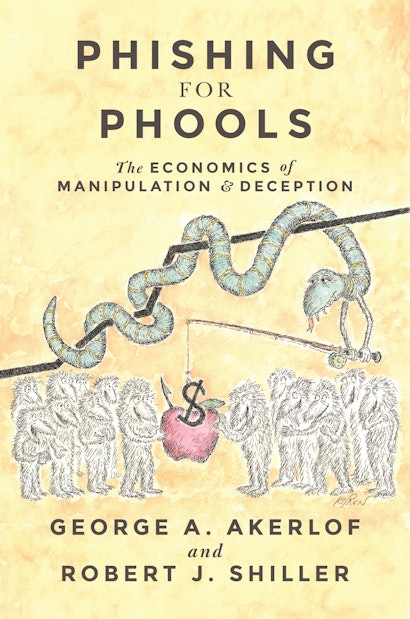"[Akerlof and Shiller] want to go far beyond behavioral economics, at least in its current form. They offer a much more general, and quite damning, account of why free markets and competition cause serious problems. . . . They are intellectual renegades. . . . Akerlof and Shiller make a convincing argument that phishing occurs because of the operation of the invisible hand, not in spite of it. . . . [This] extraordinary book tells us something true, and profoundly important, about the operation of the invisible hand."—Cass Sunstein, New York Review of Books
"No question, Phishing for Phools is a radical book. It may also be a radically important one."—Fortune
"I highly recommend this, even for those who might disagree with the authors' outlook. Their case studies are illuminating, and their insights on the way markets work are fascinating. When you consider the sorry state of the personal finances of the median working age family in the United States today, it's hard to disagree with their central thesis that our current system isn't working properly."—John Reeves, The Motley Fool, USA Today
"Entertaining, readable and provocative."—John Lanchester, London Review of Books
"A needed call for skeptical economics and financial mindfulness."—Nature
"Using compelling examples of flawed decision making from advertising, health care and personal finances, the authors identify our rational weak spots and arm readers with the ability to resist manipulation."—Scientific American Mind
"As you would expect, it's a very clearly written book with tons of examples. And it makes a simple and powerful point about the fragility of the normative, welfare economics conclusions economists tend to draw."—Diane Coyle, The Enlightened Economist
"Akerlof and Shiller present convincing evidence of how tobacco, pharmaceutical, and liquor companies and politicians weasel a chapter of their own into our life stories, abusing the mutual storytelling—with all its signs and wonders—that is elemental to our humanity."—Peter Lewis, Barnes & Noble Review
"With accessible language and everyday examples, Shiller and Akerlof are taking on the powerful belief that aside from a few blemishes (like widening income inequality) only fools advocate interfering with the free market."—Chris Farrell, Minneapolis Star Tribune
"The book's central message is certainly thought-provoking."—The Economist
"Phishing for Phools forswears technical language, making this book accessible not only to economists but to consumers and policymakers. It should make everyone rethink the unfettered free-market model."—Brenda Jubin, Investing.com
"It's a very clearly written book with tons of examples. And it makes a simple and powerful point about the fragility of the normative, welfare economics conclusions economists tend to draw."—Enlightened Economist
"Its critique of conventional economics is more powerful and comprehensive—and more paternalistic—than that of Animal Spirits."—Carlos Lozada, Washington Post
"[Akerlof's and Shiller's] insight is a powerful one."—Economist.com's Buttonwood blog
"Akerlof and Shiller show that unregulated free markets systematically make people worse off by providing the unscrupulous with opportunities to take advantage of the unwary."—Adam Bouyamourn, The National
"[Phishing for Phools] serves the important purpose of holding up a mirror to economics, a subject that prides itself on (supposedly) being the most sophisticated of all the social sciences. Economics may look sophisticated on paper, but it is often completely out of touch when it comes to reality."—Victoria Bateman, Times Higher Education
"The book offers powerful support for a skeptical view of free markets, but it's also a helpful guide for consumers to avoid getting ripped off in the course of making important purchases."—Chris Matthews, Fortune
"An interesting and entertaining new book by George Akerlof and Robert Shiller looks at the role of trickery in market economies. Phishing for Phools explains that sellers are often out to deceive you, and shows that this isn't an occasional glitch in the market system so much as an intrinsic and pervasive trait. . . . Phishing for Phools aims to help readers understand their psychological weaknesses, so that the phishermen can be phended off more ephectively."—Clive Crook, Bloomberg View
"Where Akerlof and Shiller break new ground is the sweeping application of the idea of the ‘phishing equilibrium' to finance. . . . The style of Phishing for Phools will be familiar to fans of Shiller's work: light on jargon and pacy enough not to outstay its welcome. The authors tell some engaging tales."—Robin Harding, Financial Times
"[A] surprisingly readable yet highly original book . . . the evidence and explanations marshaled by Akerlof and Shiller are compelling and they have profound political implications . . . an enlightening read by two expert economists. It should be required reading for policy makes and for consumers (which is to say, all of us. . . . [An] important, sobering book."—Oliver Kamm, The Times
"Narratives in this impressive book tell how to avoid being tricked by means of better enforcement and being told of pending scams. . . . [O]ne of the few titles dealing with fraud in the marketplace."—Library Journal
"The authors provide is a . . . unifying theory for all kinds of trickery, an economic explanation for why deception is so rampant. It takes many of our scattered findings about humanity's blind spots—both psychological weakness and a lack of perfect information—and weaves them into a comprehensive framework that has the potential to be devastating for free market fundamentalists."—Victoria Finkle, Washington Monthly
"Its central idea is an important one and merits more attention."—Emran Mian, Prospect
"Phishing for Phools is packed with examples—including subprime mortgages, pharmaceuticals, political campaigns, gym memberships, credit cards, cars and cranberry juice labels—of the pervasiveness of deception and manipulation in our economy and the price it exacts on individuals and the society at large."—Glenn C. Altschuler, Tulsa World
"This interesting book is written by economists mainly for economists, but it includes many entertaining stories about business behavior (and some disturbing ones), told in lively and accessible prose."—Foreign Affairs
"The book is easy to read and relate; and more importantly will make you start thinking of the number of times you have been phished. The list would be endless!"—Madan Sabnavis, BusinessWorld
"This unusual book offers a simple but challenging corrective to the assumptions made by most mainstream economists. . . . Probably not every reader will agree with every interpretation or argument—but every reader will find something that enlightens and stimulates."—James Ledbetter, Yale Alumni Magazine
"This book was enjoyable to read, and the expertise and knowledge of the authors are abundantly evident."—William Holcomb, PsycCRITIQUES
"Bob and George urge us to slap Adam Smith's invisible hand when it steals from everybody's cookie jar. They ask us to ponder those situations, economic or political, that provide particularly tempting opportunities to phish for phools. . . . Penetrating insights rendered in accessible prose."—Marlene Lang May, Commonweal
"The book is the result of deep thinking and presented in an entertaining and easy-to-grasp manner."—Leonhard K. Lades, Journal of Bioeconomics
"George Akerlof and Robert Shiller, two of the biggest names in economics for the past half century, take aim at the widespread assumption that free markets ted to produce the best outcomes."—Adam Creighton, The Australian
"In an entertaining and lively account, Akerlof and Shiller show that while the pursuit of profits may lead to products that enrich our lives, it may also lead to manipulation and deception. Much of recent innovation has led to products that make cheating the public easier. The implications are complex and profound."—Joseph E. Stiglitz, Nobel Laureate in Economics
"Phishing for Phools is an intellectual tour de force. It may change your image of the invisible hand into an invisible phoot, always looking to trip you up. Read it for phun; read it for wisdom."—Alan S. Blinder, author of After the Music Stopped: The Financial Crisis, the Response, and the Work Ahead
"A phabulous book! This is economics after the behavioral revolution at its best."—Samuel Bowles, Santa Fe Institute
"Akerlof and Shiller provide a phenomenal guide to the pitfalls of the phree market. This redemptive revision of economic theory explains the built-in risks of rip-offs in a profit-maximizing world."—Nancy Folbre, professor emerita, University of Massachusetts, Amherst
"As Akerlof and Shiller remind us, the same incentives that lead sellers to introduce innovations that improve quality and reduce costs also ensure that no profitable opportunity to cheat us will remain unexploited. This highly readable and insightful book will transform how we think about the role of government."—Robert H. Frank, author of The Economic Naturalist
"Akerlof and Shiller extend the standard ‘market failure' theory—which says that there is a potential role for government intervention when markets fail—by showing that markets fail not only because of the familiar reasons of externalities and unfair income distribution, but also because of the pervasive phenomenon of ‘phishing for phools' (profit-seeking through manipulation and deception). They point the way to a new paradigm freed from the constraints of market failure theory, able to illuminate ‘control by capital' (partly through phishing) and to prescribe for ‘control of capital' (partly by techniques for limiting phishing suggested here)."—Robert H. Wade, London School of Economics
"This insightful book exposes a fundamental contradiction in the market system. Consumers and policymakers beware: profit-seeking businesses foster efficiency and innovation, but have strong incentives to manipulate you and sophisticated new data tools allow them to do so in personalized ways."—Laura D'Andrea Tyson, University of California, Berkeley
"This fun but serious book tells how the standard story about free markets often gets it wrong. Indeed, Akerlof and Shiller suggest that we should drop the view of markets as generally benign institutions. The argument is laid out with the help of fascinating anecdotes, the language is conversational, and the book is easy to read. It is addressed to a broad audience, but economists will enjoy it too."—Dani Rodrik, author of The Globalization Paradox
"Phishing for Phools is a coherent and highly plausible explanation of why markets—although usually beneficial—can lead to undesirable outcomes. The book takes an intriguing approach and gives many interesting examples."—Diane Coyle, author of GDP: A Brief but Affectionate History



